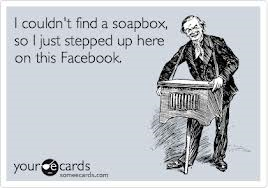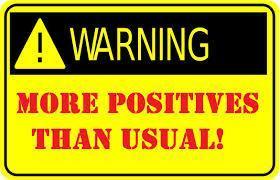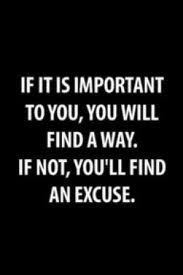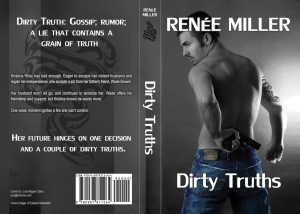Renee Miller's Blog, page 16
May 7, 2014
To Rant or Not to Rant?
The Internet is a wonderful thing, is it not? Of course it is. Sure, it has its issues, but in general, look at all the “things” people can accomplish simply because the Internet exists. Without it, I wouldn’t have been able to work from home for five years. I’d never be able to share my writing with all of you. I wouldn’t have met the amazing and inspiring people I like to call friends, even though I’ve never met them “in real life.” I wouldn’t have learned from these people, and I certainly wouldn’t have “all the knowledge” at my fingertips. Let’s face it, leafing through encyclopaedias and such at a library or wherever is just not fun for most of us. Google, I do love you.
The Internet also allows us to be “heard”… by a shit ton of people. This is problematic for a few reasons. It’s fantastic that everyone gets a voice, and I think we should all embrace that, but sometimes we take it a little far. These days everyone gets offended on a daily basis and we’re eager to rant about it the minute it happens. But should we? In my opinion, you all should feel free to rant about whatever you want, but if you don’t want the world to perceive you as a dick, don’t go off on a tirade without thinking about it first.
Ranting is one of my favorite things. I love ranting and I love reading/listening to other people rant. Sometimes all the awesome in the world is contained in one tiny little Facebook or blog rant. But as I’ve said before on this blog, there is an art to ranting, and with that art comes an unwritten set of rules. You don’t have to follow them, but if you want to be heard and your opinion considered or at least respected by others, it’s wise to at least try to abide by a few common sense guidelines.
If you’re considering a rant, I recommend you do the following to ensure it isn’t just one more piece of angry, self-righteous fluff floating around Cyberspace, collecting trolls and such:
Have a purpose: Ranting because you just want attention is boring. It’s annoying too. Eventually, people are going to be all “Oh, look. Renee’s yelling at us again. Yawn.” And soon they’ll just ignore everything you say, even when it’s important. So make sure your motivation isn’t attention-seeking. If you want to be the star, join a theater company or something.
Educate: This is kind of related to the first rule. Say whatever you want about whomever you please, but try to at least bring something informative to the table. Teach us something. Show us a point of view we might not have considered. Make us at least THINK about your issue or your words. Rants that say nothing waste people’s time. Time is precious. Got it? Good.
Research: And this goes with the above. Don’t go all stabby-yelly without getting your facts straight. Nothing ruins a damn fine rant faster than misinformation. It makes you look like a moron and it makes informed people pretty angry. Then they’re going to rant about your rant, and they’ll have facts behind them, so whatever you hoped to gain in speaking out is lost, because your credibility is ruined. Facts are good. Ignorance is bad. Remember that.
Remain calm: You can be passionate and sweary and whatever when you rant, but before you type your little speech, take time to cool your jets. Angry rants posted in the heat of the moment can be hilarious, but not in a good way for the ranter. You want to be the object of mockery and pity? No, I don’t like that idea either. So, take a breath. Step back. Think on it. Have a drink or do whatever calms you the fuck down. Then if you still feel passionate about what you have to say, go ahead, but choose your words wisely. Also, TURN OFF CAPS LOCK. Fucksakes, that’s annoying.
Avoid repetition: Repeating the same rant over and over makes you look like a whiner. If something is bothering you or you feel an issue is being ignored, then do something about it. You know, like get off your ass and actually take action. If you feel it’s not worth the effort, don’t bore the rest of us by talking about it every other week. Some of you even do it daily. Just cut it out.
Offer solutions: I think this is the most important thing you can do before embarking on an Internet rant. If you’re only bitching about the issue, you’re not doing anything to correct the problem. Sometimes you’re contributing to a whole other mess by doing so. Instead of running your mouth right away, take time to think up at least one solution and offer this as part of the discussion. Nothing changes if no one tries to change it, and talking is just words. Take action.
So, in conclusion: Rants are awesome, but they can also be ridiculous and pointless. The Internet is also awesome, but blah, blah, same as above. It gives us a voice, and it gives us tools, but it’s made it too easy to just bitch and moan about problems instead of actively trying to fix them. Before the Internet, we had to act if we wanted to be heard, but now far too many people think just hopping on a virtual soapbox is enough. It isn’t. It never will be. So, you know, stop it. Also, tip your server.
Tagged: Internet, rants, social media








April 29, 2014
The End
But is it ever really over? This is a question that haunts me as a writer. And lately, I’ve been obsessed with analyzing every ending I’ve ever written. I should explain. Sit tight. I’m about to ramble.
I’ve had mostly fantastic reviews of my books, but I’ve also had some that were not so great. These bum me out, because I can be a drama queen now and then. Mostly, though, I try not to look at reviews very often. Actually, I try to avoid them altogether, but sometimes a well-meaning friend tells me about a positive review and I go read it, gloat a little, and then I see there are other new reviews. Oh look, this one’s only two stars. What happened? I check it out, and then down the rabbit hole I go. Usually ends in tears and ugliness so I won’t go there right now.
Reading reviews isn’t wrong. How else will you know what readers think of your work? Obsessing, though, is bad. Taking any of them personally is very, very bad. I think a smart writer appreciates the positive reviews, but doesn’t view them as gospel. She enjoys the ego stroke, but doesn’t get too cocky. She looks at negative reviews with a critical eye, and doesn’t get upset or take the criticism personally. Instead, a smart writer tries to use the negative points to figure out where she can improve.
So, I did that (it still stings), and the basics are:
Sometimes I cross the line into completely implausible, never going to happen types of stories. I don’t think I’m changing that, because it’s what I do and lots of readers love it. Implausible is sometimes an excellent way to escape. if the real world is making you sick, then a completely fictional adventure can be the perfect cure. However, this doesn’t mean I can’t improve. I have to make sure what I write is compelling enough that the reader is willing to believe the impossible. Obviously, for some readers I’ve failed in this area. I am working on correcting the problem.
My characters swear too much. Hmm. The thing is, I’ve scaled it back significantly already. Do I remove profanity completely? No. So, we’ll go back to this another time.
The reader couldn’t get interested. Knowing I’ve bored a reader into closing the book keeps me up at night. While only a couple of reviews include phrases like, “Just didn’t interest me,” this is my JOB, so it’s really troubling if even just one reader isn’t interested in finishing the book. I have to interest the reader, or I’ve failed. So now I have to figure out where I lost them. We’ll come back to this at a later date. (When I figure out where I went wrong and how to fix it)
I suck at endings. It’s possible I just end books in a way that only appeals to certain readers, but the majority of my not-so-awesome reviews mention being disappointed in how the book ended, so I need to examine what I’m doing and make changes.
That’s what I want to discuss today. Endings are hard. As a reader, I know a shitty ending can ruin an otherwise awesome book. I hate when I enjoy a book until I reach the last page. I remember the sour mood a crappy ending gives me and forget how I tore through the other 299 pages with ecstatic glee. So, when I see a review that says the ending I wrote sucked ass, I panic. Why? Because I can’t please everyone and I really want to. I want to write the perfect ending. I just don’t know how.
Should the writer tie everything up in a neat little package, or does she leave some ambiguity so the reader is free to imagine what happens next? (this is what I’ve done in the past) How much ambiguity, though, can you allow before you end up with the dreaded cliffhanger? Are cliffhangers really so bad? (the answer is yes, in my opinion) If I clear away every single detail so the reader has zero questions left, then am I not doing all the thinking for her? Is that what she wants? I don’t know.
Different types of endings are necessary for each book, though. For example, I have books that are standalones (Dirty Truths, The Legend of Jackson Murphy and In the Bones) and I have books that I’ve plotted as part of a series. Lucky, for example, is supposed to be the first of one of these series, but I tried to make them as independent of each other as possible. Imbroglio, a current WIP, and Sex, Peanuts, Fangs and Fur, a finished project I’m currently querying, are plotted as trilogies (although I haven’t finished outlining, which is a very naughty thing to do, just so you know), and should be read in the order they’re written. Each of these requires a different level of finality at the end, and have threads left dangling that are tied up in future books.
I thought I gave the first three books satisfying endings, but a handful of reviewers disagree. They mentioned feeling the endings are rushed or weak. Do I rush endings? I think I might. How do I fix that? Good question.
With the series books, I’ve left questions at the end. No cliffhangers, per say, but I definitely didn’t tie all the bows.
Now it’s bothering me. I keep thinking I need to go back and rewrite these endings so there are zero questions. Then another part of my brain tells me that’s ridiculous. Part of the thrill of a series is uncovering new things as you read each book. Then another part of my brain says, “Mmmm… Doritos” and it partners up with the part of my brain that is addicted to Netflix, and they convince me to put off making any decisions.
So I’m asking all of you how you feel about endings, both as readers and writers. Is it even possible to write the perfect ending? If yes, teach me. If no… we’re all doomed, I suppose. (I know, that was a little dramatic. I told you I suck at endings.)
Tagged: books, endings, help, readers, reviews, writing








April 7, 2014
Obligatory Motivational Post (You only get one or two of these a year, folks)
I’ve been writing most of my life, but only tackled “serious” writing about five years ago. Before that it was short stories for my own amusement, poetry (terrible poetry) and emails, letters, etc. to make friends laugh. So, when I started down the “writing to publish” road, I had no clue what waited for me. I’ll admit there were many tearful moments and lots of f-bombs and other curses. In the end, I’ve learned a few things:
Writing is hard.
Publishing is harder.
Quitting is tempting.
Vodka makes me vomit for days.
Repressed anger gives me a rash.
Houses do not clean themselves.
Selling books is a tough road, particularly if you take the Indie route. Without the right connections, word of mouth, etc. your book, no matter how fantastic it is, could sit on that virtual shelf forever without selling more than a couple of copies. My first two sold very few copies via Amazon and such. I sold a ton locally, though. (Sadly, I was stupid about pricing and it actually ended up costing me money. Live and learn, right?) But I was obsessed with WHY those books just wouldn’t budge. And reviews? Pfft. Good luck.
At some point, we all have to face reality and decide whether this is the right path for us. I’m writing about this today, because I just read a farewell blog post by an indie author who just can’t do it anymore. It makes me sad, and it makes me a little angry, because a large part of this person’s decision to give up is the bullying nonsense that’s become a problem on Goodreads, Amazon, and other review-type sites. This author is doing what is best for her. Publishing (both indie and traditional, as well as the review process and social media) chewed her up and spit her out and she feels she is emotionally, financially, and psychologically unable to continue writing or publishing.
Reading that post broke my heart.
And now that we’re approaching “emotional” territory, I shall add the obligatory cutest animals ever picture to ease you into the feels.
Ready now? Okay, so I’ve been pretty open about my own issues with the whole process. I have days where I want to quit. I have moments (probably way too many) when I read my writing and feel like I’m completely useless and horrible. I’ve also been torn between my personal obligations to my family and friends and the demands of writing, marketing, etc. For example, when my dad passed away, I had many dark days where I seriously considered packing it all in. Lucky for me, I have a hard time quitting anything.
But I had to give myself a reality check recently where I asked myself what the hell I was doing. Should I continue writing? Why? Why not? Would I ever be successful (in my opinion)? If I’m not, does that make a difference?
After a lot of soul searching, I decided I needed to stop writing for other people and I quit freelancing. Why? It’s not a reliable way to make money when you don’t have the experience or education to back you up (helps to get the good jobs and clients), and it can be soul-shattering. I had to face the fact that most of my self-doubt over the past few years has stemmed from my freelance work.
So, after convincing myself it wasn’t “giving up” I stopped the freelancing and started searching for a “real” job. I discovered something interesting: with the freelancing gone, I WANT to write again. Since early last summer, I’ve only written because I felt I should. It’s nice to actually need the experience again.
I guess the reason I’m writing this is to say to anyone else out there hovering over the “This is bullshit and I can’t do it anymore” button, you’re not the only one. We all have moments when enough is enough. We all hate querying. We hate rejection. We cry or get blind drunk over bad reviews. We cringe at the social media bullshit, and we have a “List.” (Okay, maybe that’s just me.) But if writing makes you happy, don’t let that shit get in the way. Keep going. You don’t have to publish, but don’t stop doing what fills your soul with the good, fluffy shit that makes you smile.
I also want to say to anyone reading and reviewing books, remember the person behind the book you’re reading is human. I’ve been guilty of scathing reviews too, but over time I’ve realized no matter how terrible I think the book is, a monumental effort went into its writing. Be honest. Don’t sugar coat your opinion. If you don’t like a book, you don’t like it. Whatever. But let’s leave the author and her ancestry out of it. Let’s not make assumptions about how much time or effort she did or didn’t put into the book. Let’s tell other readers why we think the book is worth reading or not, and leave it at that.
For those of you that can’t handle negative reviews, just stop. Don’t read them at all. Seriously, you’ll drive yourself batshit.
For those of you engaging in debates, arguments, etc. with idiots on these review sites or anywhere else online: Bang your head against a wall every time you feel the urge to comment. You’ll see better results.
And I have a question for other writers out there: What keeps you going when everything (or everyone) else is telling you to quit?
Tagged: bullies, fluffy shit, perseverance, publishing, quitting, writing








April 2, 2014
Book Marketing Tips: Virtual Launch Parties
Anyway, this post is based on my personal experience with book launches and such. There are probably better ways to do it, or at least different ways that might work better for you than they do for me. If you all have marketing tips, please share them with us. We love tips.
Let’s begin, shall we?
Image Source: http://www.worldliterarycafe.com/content/one-one-book-marketing-consulting-0
In March I released my third novel, Dirty Truths. As I planned the launch party, I realized a number of authors have never even heard of a “virtual launch.” Quite a few readers are in the dark on them too, so I thought why not share this little marketing gem? A virtual launch party is an online event where you promote your book. It’s like a regular launch party (which might be held at a library, bookstore or bar/restaurant-type of place), but you get to do it from the comfort of your home, in your pajamas, or naked. Whatever floats your boat. Readers get to learn more about you and your book, and you don’t even have to go outside. Awesome, right? You also reach readers all over the world, instead of just those living near you. The Internet is truly amazing. Anyway, I’ve compiled a few tips based on virtual launches I’ve hosted and attended. Come on over to the DPP Blog and see what I’ve learned so far.
Tagged: Dirty Truths, marketing, promotion, virtual launch parties 







March 22, 2014
I’m an Impostor, Are You?

Image Source: http://www.politicsforum.org/images/flame_warriors/flame_53.php
Earlier this week I shared a review of Dirty Truths with my friend, Katrina. I said something about how crazy it was that the reviewer got so excited about it. I also told her it amazed me every time someone does that over my books. I know I gush over books I’ve read, but this is me and my book, so it’s weird. Apparently, I’ve said something similar before, because she replied, “It’s funny how you’re continually surprised when people like your books.”
I almost denied it, but she’s right. I am surprised. Every single time. A positive review is more of a shock than a negative one. Why? I don’t know. It just is. Then Hanna joined the conversation (we often have these three-ways), telling me that my weirdness is called “Impostor’s Syndrome” and it’s very common for authors.
This term is new to me but when you think about it, the feeling that you’re not “good enough” and someone will eventually figure it out and tell the whole world is understandable in a creative area that involves reviews.
So I Googled it, of course. And it’s not really new to everyone else.
Impostor syndrome if defined by folks who know more about this stuff than I do as a ”collection of feelings of inadequacy that persist even in face of information that indicates that the opposite is true. It is experienced internally as chronic self-doubt, and feelings of intellectual fraudulence.”
But let’s break it down a little more. Impostor’s syndrome involves the belief that you don’t deserve your success or position and have somehow deceived others into thinking you do. You fear at some point readers will figure out your game. In my case, it’s not that I believe I don’t work hard or don’t produce good work (I’ve worked damn hard for every scrap of success I get), but I do fear someone will suggest I’m not as good as some reviews say I am. I know it’s ridiculous, but the fear is there nonetheless. Is it rational? Of course not. Who says I’m rational?
Some “impostors” credit success to luck instead of their abilities. I think most of us believe this at least once in our writing career, but we also know we’re competent enough at writing to deserve the “luck.” An impostor fears he never had good ideas or writing to begin with. Basically, you believe a publishing contract or publishing a book that pleases readers is a fluke you may not be lucky enough to see happen again.
Impostor’s syndrome can also cause you to “downplay success,” saying things like you really didn’t work that hard, or the book isn’t “that” good. You might have a hard time accepting compliments about your books too. I can totally relate to this one. I confess, I’m always skeptical of a gushing review. It’s like they’re up to something that will turn out horribly wrong. We never said I was sane either.
You’ll find a lot of psychological mumbo-jumbo from really smart people (who are probably right) to explain why or how you became an impostor, but I think for authors, part of the cause is this industry.
Right, blame publishing.

Image Source: http://hiddlessitslikeaslut.tumblr.com/post/70565264741/a-loki-eye-roll-because-its-not-friday-yet
Actually, I’m not blaming publishing specifically. You have to have a certain type of personality for this to be an issue. For example, when I was in school, I decided my identity and my worth was directly linked to how smart I was. Yeah, I was one of those kids. I was taller than all the boys were, my hair was reddish and poofy, I had freckles, my skin was so pale you could almost see through it, and I was ridiculously clumsy. Before that, I was so fat I couldn’t even run without falling over my thighs… I had to find something to make myself feel good or I probably would’ve jumped in front of a truck.
Anyway, I’d make myself sick over a grade that was less than the best in the class. It was exhausting to be that person. This type of person going into publishing is perfect for Impostor Syndrome.
The query/submission process as well as the way books are marketed (reviews, author platforms, personal image, etc.) make it easy for any of us, neurotic or not, to fall into this kind of mental trap. As authors, we’re putting on a show to sell each book. With each show, we struggle to maintain some of our selves in that image, or to make sure every reader likes the self we’re putting out there. And I don’t think I have to explain how querying agents and publishers makes you feel like a sack of shit. Rejection always puts a ding in a person’s self-esteem and cranks the paranoia level to “high alert.”
And let’s not forget the editing process, in which someone changes your words, phrases, sometimes, the direction of the plot or characters, and points out every mistake you made, so it feels like maybe you didn’t do such a shit-hot job on your own. You need these edits. Everyone does. But it’s easy to feel “not good enough” after reading through 300 pages of red marks. It’s harder to remember EVERYONE needs an editor and even the authors making the big bucks write shitty first drafts.
Once the book is out there, readers take a stab at your ego as well. Reviews sell books. We need them, both good and bad. It’s hard to ignore the sting of a bad review. Now that your ego is so battered, it’s also hard to believe the good reviews.
So how do you stop thinking this way? Good question. I’m not sure. I’m a confident person. I rarely get tearful or stabby over slights, but my books make me feel vulnerable in a different way than regular life does. Vulnerability is not a comfortable place. No matter how well I do, I can’t stop doubting myself or my writing now and then. Is it because we’re always learning? Because writing is never perfect? Is it lunacy on my part? I don’t know. I’m aware that my surprise at good reviews is ridiculous, and I know I can write a decent story. Yet, I feel undeserving. Do what you will with that.
Anyway, the professionals say imposter syndrome causes you “over internalize” your failures. Well, speaking from my personal experience (I queried for four years), more than 500 rejections tends to make a girl more than aware of her shortcomings. I think it makes sense.
I do think authors are under a lot of pressure not to fail. This pressure comes from both from themselves and their readers. This makes it hard to enjoy success when it happens.
So, now that I’ve rambled on and on, and I’ve confessed my insecurities, please tell me I’m not the only one. How do you stop the inner critic?
Tagged: books, Dirty Truths, impostors, publishing, reviews, self-esteem, success








March 15, 2014
What the Hell is My Genre?
Today I’d like to have more of a discussion than a post where I talk at you. I know, it’s rare, right?
First, some promotional stuff to get out of the way: Tomorrow is the official launch day for DIRTY TRUTHS. Author, Hanna Elizabeth, has joined me on Facebook to officially launch her latest book, CONCESSIONS. If you’re just hanging around tomorrow, come on over to the Virtual Launch Party page and say hello. We’re giving away more than 20 eBooks, and I’ve got tons of fun planned.
Now, to the question of the day, which has been occupying my thoughts as I try to establish something that resembles a marketing plan: What the hell is my genre?
What’s yours? Do you write in just one? More than one? Does it matter? I don’t have a specific genre, to be honest, but I know it’s something that DOES matter when you’re sitting down to figure out how you’ll market your books.
As you all know, I write romance, crime/suspense, and sometimes fantasy (in the form of paranormal fiction. That’s fantasy, right?) I write romance because I find it challenging. Yes, I said challenging. It is EXTREMELY hard to write to a formula, although many believe the opposite. Writing something fresh, engaging and “unique” is hard to do when you have to fulfill certain criteria.
I even have a slipstream novel in the works. (Although, I didn’t know that until I asked another author to help me define it the other day.) And my gods series is most definitely paranormal romance and completely different from everything else I’ve written.
The only similarity (I think) between my books is the voice, obviously, and I try to add humor in each one too, as well as at least one character that’s dark and twisted. Sometimes the whole cast is messed up. Basically, I write what fits the story in my head, but it rarely falls neatly into a single genre. We all have that problem, I’m sure, but should we modify our books so they WILL fit into a genre, or do we leave them alone? I think to see any success in the traditional industry; you have to be willing to bend a little to make your books easier to market.
Sometimes I feel like I need to “warn” readers who like a particular book that the next book isn’t quite the same. It’s probably not necessary, I know, but I worry readers will expect one thing and get something else entirely. If you like crime/suspense, for example, and enjoyed IN THE BONES, and you pick up LUCKY, the difference would be quite startling, and maybe not in a good way.
The bottom line: Promoting multiple genres under a single name is a bitch. Readers that enjoy one book may not like what you publish in a different genre. Piss of a reader and that’s it, folks. So how do you do it? How do you cultivate a broad enough reader base?
Should you use a pen name? I don’t like that idea. I worked hard to build the readers I have with this name. The thought of building a new following of readers with a different name brings on a mental breakdown.
I’m still working on the answer to all of this, so I’d love to hear your suggestions. Has the industry changed enough for authors to spread our wings a little more? Have you had success writing multiple genres? How do your readers respond?
Tagged: book launch, Concessions, Dirty Truths, genre, Hanna Elizabeth, help, marketing








March 5, 2014
Three Secrets to Publishing Success
Today I’m going to be a little philosophical. Don’t panic. The universe is still intact. Sometimes I like to be all spiritual and shit, but it passes quickly and life will return to normal when I’m done.
So, success in publishing requires three things:
Fate
Luck
Good Karma
Oh now you’re all pissed, right? I lured you in here with promises of secrets and then I hand you a line of bullshit. But wait, I’m totally serious. I was just going to talk about my series of novels (For the Love of Gods), and how things like fate and luck are major themes, as is Karma. Why? Because I’m fascinated by all of it. The possibility of forces greater than ourselves is intriguing. But blaming these forces for all your bad days, or giving them credit when good things happen baffles me.
And that’s when the brilliant Lauren Stone suggested I write about how these three things are the key to publishing success. So here we are.
When bad things happen, we talk a lot about our bad luck, or we curse Karma and wonder what we did in a past life to deserve these shitty happenings. Maybe some of us know exactly what we did. And then when good things happen, we’re all like “Oh my God, it was Fate.” I’ve done it too, but I know my choices and my reactions to people and events are what bring good and bad into my life.
But Renee, you say, that’s Karma. You’re right, Karma is based on actions and requires you put goodness out into the world to receive goodness in return. And luck is random and elusive, and it can happen to even the shittiest soul. Fate, on the other hand, is predetermined by a greater force. It’s inevitable. Nothing you can do about it.
Not true.
Fate is an excuse. It is changeable, and while I believe we all have a predetermined road we must travel in life, this road forks in many directions. Whether we walk straight to the end, or take a detour down one of these side roads is up to us. A major factor in your destiny is what you put out into the world will come back to you. Good or bad, it all changes your Fate.
So, how does this all relate to publishing success?
You have inside you a need or a passion for writing. Let’s call that Fate. You have a creative mind that urges you to write down what’s rolling around in there. Whether you choose to accept this fate or not is up to you. Let’s say you have. Wonderful.
Maybe you meet a few writer friends, or someone tells you about a writing group or publisher looking for what you’ve got. Okay, so your new friends help you navigate the publishing waters initially. As you grow as a writer, and time passes, maybe these friends become the core of your support system or your network. You can’t imagine how you would’ve managed this roller coaster without them. That, my friend, is luck. It’s not Fate, because these people travel different paths, and could’ve made any number of choices that would’ve led them to different people. It’s luck (as in a random series of events and decisions) that you all chose the paths that led you to each other. Luck brought them to you, but you determine how you benefit from their presence.
Let’s say you cultivate these friendships. You’re there for them, they’re there for you. It’s all happy and wonderful and all that good shit. As you’re doing this, you also work hard to learn what you need to know to write well, instead of just vomiting a pile of crap onto the page. You persevere despite rejections and momentary lapses into hopeless desperation. Then one day, you either sign with a publisher (if this is your goal) or you publish something yourself.
And it sells. And readers like it. And you start getting the feels for the whole process and everyone in it. You know the ride isn’t going to stay high like that, but the morsels of success keep you going because it’s so amazing when it happens, you’re determined to see a repeat performance. So you write another book and another. It doesn’t get easier, but you’re seeing results. That’s Karma. You’ve worked hard, and you’ve helped others, and now Karma is saying, “Shit, girl, you deserve some rewards.” *sprinkles magic reward dust*
In other words; Your success in publishing is all up to YOU.
Tagged: fate, karma, Lauren Stone, luck, publilshing, secrets to success








February 24, 2014
Changes and Such: Because You Guys Are Dying to Know What I’m Up To
Let’s begin with publishing updates: Dirty Truths will be released in mid-March. (bites nails) I’m in the final stages of editing and Carlos has worked his formatting magic while Luis created a kickass cover. I’m not sure if I’m more in love with “Wade” or his ass…
Anyway, a virtual launch is planned, which you all can participate in on Facebook and Twitter. I’ll update you with specific details in a couple of weeks.
In other news, “Lucky” is getting close to a publication date as well. When I have more information (and a cover) I’ll share it with everyone too. I’m really excited to see what Crescent Moon comes up with for this book’s cover. They have many other book covers that are drool-worthy, so fingers are crossed.
As I finish edits on that one, the second book in the series, “Mendacious” is nearing the query stage, in which I send it to the publisher and hope they decide it’s a good follow-up for Lucky.
What’s Mendacious about? Well, this is my shitty query so far:
To appease Hera, Zeus exiles his Halfling son, Dionysus, in Elysium, but forgets to lock the doors.
For years, Dionysus escapes his prison undetected … until he crosses Aphrodite. Angry with Dionysus for discarding her and wasting his affections on the humans, Aphrodite follows him to Earth, where she casts a spell that could alter Olympus forever.
Zeus grants Dionysus a reprieve, and sends him to Earth in Death’s stead.
And the seed planted by Aphrodite bears fruit.
No one on Olympus realizes they are pawns in a game run by a powerful force. From the shadows, Chaos carefully orchestrates their movements. Her goal: redesign Dionysus’ Fate.
If he finds his heart, Dionysus can rule it all, and he can free Chaos from Tartarus. But Dionysus refuses to plot against his father, so Chaos must hatch a new plan.
Her most valuable player may be one whose future is not yet colored by Fate.
It’s not done. So let’s move on from the above awfulness.
The big news (at my house anyway) is that I’m getting what they call in the grownup world a “Real Job.” Yikes, right?
I’ve known I needed to make a change for a while now. When your “fun” writing time dwindles to almost nothing, or you simply stop enjoying it, something is wrong. For five years I’ve managed to work from home, and it’s been really convenient in terms of my kids and their needs, and in getting my writing off the ground, but for the past year or so, staying at home has cost me some sanity, as well as complicating my family life and my writing. It’s a long story with many boring twists and turns, so I won’t torture you all with the details.
To put it simply, I’ve decided enough is enough. The universe helped push me toward this decision, but I think it’s the right one. While it’s true I’m not crazy about people most days, I do miss the interaction. And this town is so colorful, I’m bound to be inspired on a daily basis. Or homicidal. But that works too.
This means no more hourly procrastinating on Facebook, Twitter, etc. I can only do that on my days off… or at night. So really, nothing will change.
Tagged: changes, Dirty Truth, life, Lucky, Mendacious, queries, updates








February 17, 2014
What Your Favorite Swear Word Says About You
There WILL be profanity in this post. Duh.
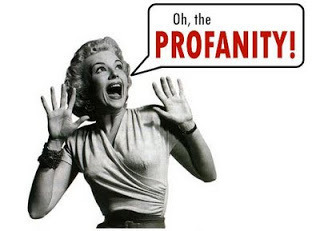
Because it’s my birthday today, I’ve decided I can do all of my favorite things. So, let’s talk about one of my top three: Swear words. I like to swear. But then, you all knew that. When I’m writing, though, I have to weigh the real value of each profanity I use, because it is possible to use it too much. This tends to ruin any impact or color added to the character or dialogue. Instead, I focus on what the swear words used say about the character using them. But let’s step back a bit and discuss swearing in general first. Comedian George Carlin listed the “Seven Words You Can Never Say on Television” in a 1972 monologue. These are kind of like the seven deadly sins, but better because we’re not as likely to go to Hell for indulging. I mean, if there is a Hell. Maybe we all go to the place of rainbow-shitting unicorns no matter what we do. Something to think about, right?
Anyway, Carlin’s seven words are: shit, piss, fuck, cunt (sorry, Mom), cocksucker, motherfucker and tits.
These words were considered extremely offensive at the time, and in the U.S. they couldn’t be used on television or radio. They continue to be largely taboo on broadcast television, although I’ve heard shit, piss and tits uttered more than a few times in recent years. Just saying. And I am aware that HBO doesn’t count. Carlin’s list is great, but for this blog post I’m going to modify it a little to include the words used most often today that are still considered offensive. Also, motherfucker, awesome as it is, is a derivative of fuck, and so it cannot be counted as a separate word for the purposes of what I’m doing here. My blog post, my rules, motherfucker. Deal with it.
So, which do I count as the deadliest swear words? Well we have a “Big Six” when it comes to swear words in today’s English language: Ass, bitch, cunt, fuck, dick and shit. It’s been decided (mostly by me) that tits, damn and piss are not swear words. They’re rarely offensive and are used to pepper your vocabulary with a mild dash of flavor when you know you can’t use real swear words.
Now, as I said before, the way you speak and the words you use say a lot about you. Most of our vocabulary is influenced by things we can’t control, like age, region and upbringing. Swear words, though, are usually conscious word choices. They’re taboo, so when we use swear words in social media or our writing, most of us pause to consider them first. Yes, even me. This is why swear words can be used to determine someone’s personality. Not scientifically. That would be silly. This is purely based on my opinions, which in my opinion, are usually pretty accurate.
Anyway, let’s look at the Big Six and see what your favorites say about you. Remember, we’re talking about the swear words you say most often, not the ones you think. If the word doesn’t cross your lips, it doesn’t count.
Come on over to DeadPixel Publications with me to see what your favorite swear word says about you.
Tagged: fucktastic, humor, profanity, writing








February 10, 2014
So You’re a Guy Trying to Write in a Woman’s POV…
I had a little fun with the boys at DeadPixel Publications’ blog. I might have given away our secrets, ladies. I’m talking about guys who want to write a female protagonist.
Don’t let us ladies scare you, because mostly we’re full of shit.
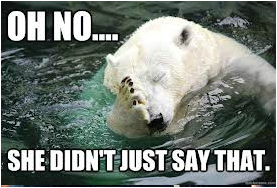
She did NOT just go there.
Oh the bitch went there.
Ready the Nair.
This whore’s getting scalped.
But seriously, I just read a book written by a man in the POV of a woman. I loved it, but I later learned he had the unfortunate luck of getting a female editor hell-bent on the perpetuation of this myth that women don’t do anything stereotypes say we do. Personally, I thought he did well. As a woman reading a female character in second person POV, I easily saw myself acting and thinking like her. Sure she fainted a lot, but I saw it as a quirk in the character’s personality, not gender related.
The truth is women are not a mystery. It’s not the vagina that makes it hard for men to write from a female POV, unless you’re trying to describe childbirth. That’s kind of a “You had to be there” sort of thing. (Tip: Go with horrible and messy and you’re on the right track.) Whenever you try to put yourself in any shoes but your own, you’re going to have to work to get it right, male or female.
I’d like to see more books written by men with a female protagonist, because most of my favorite authors happen to have testicles, so now and then I’d like to relate to the main character on another level. So here are some stereotypes you don’t have to avoid, because women are totally lying when we say they’re not true.
**Disclaimer** The following does not apply to every woman, as there are exceptions to everything. This information is generalized and based on knowing women of all ages with different backgrounds. I surveyed a few too, real official-like, which is best done, by the way, over drinks. We’re more honest like that. Also, I base the following on the fact that I’ve been a woman for most of my life.

That’s right.
Stereotype #1: The Emotional Roller Coaster
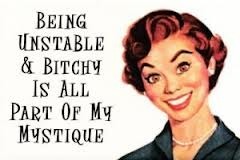
The only humans on the planet who aren’t emotional are broken. So let’s remember that. Women, though, have something called estrogen and PMS. (That means pre-menstrual syndrome, for the slow kids.) I don’t know about other women, but I can tell you that I am insane at least one week every month. I want to cry, throw things, beat people up, and sometimes just die. It’s not always dramatic or obvious, but this is what goes on in my head. I’m sensitive to the slightest negativity and can go from happy-go-lucky to homicidal bitch in less than a heartbeat. Women who claim they don’t cry over stupid shit are either robots or they’re lying. I don’t cry when I’m sad. Usually I do the angry cry, which is frustrating. But my point is everybody cries. Some of us just do it in private, over a glass of vodka and an episode of Supernatural.
Read the rest at http://www.deadpixelpublications.com/1/post/2014/02/so-youre-a-guy-trying-to-write-from-a-womans-pov.html
Tagged: humor, POV, stereotypes, women, writing









